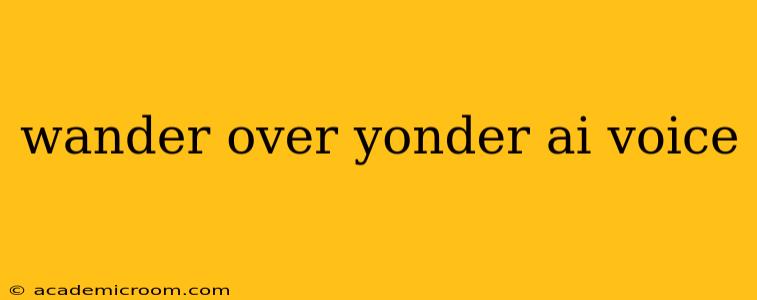Wander Over Yonder AI Voice: Exploring the Possibilities of AI-Generated Audio for Animation
Wander Over Yonder, the quirky and beloved Cartoon Network series, captivated audiences with its unique blend of humor, adventure, and charming characters. Now, imagine the possibilities if AI could generate voices for future episodes or even fan-made projects. This article explores the potential of using AI voice generation for Wander Over Yonder, addressing common questions and highlighting both the exciting opportunities and the challenges ahead.
Could AI realistically recreate the voices of Wander and Sylvia?
This is a complex question. While AI voice generation technology is rapidly advancing, perfectly replicating the nuanced performances of actors like Jack McBrayer (Wander) and April Winchell (Sylvia) remains a significant hurdle. Current AI models excel at mimicking general voice characteristics, but capturing the subtle inflections, emotional range, and comedic timing that define these characters would require significant advancements. However, AI could potentially create convincing approximations of their voices, particularly with access to a large dataset of their lines.
What are the potential benefits of using AI voices in Wander Over Yonder projects?
The benefits are considerable, especially for fan-made content or potential future projects:
- Accessibility: AI could make it easier to create new content, even with limited resources. Fan projects often struggle with securing voice actors, and AI offers a potential solution.
- Experimentation: AI allows for experimentation with different vocal styles and interpretations of the characters. This opens up creative possibilities not easily achievable with traditional voice acting.
- Cost-Effectiveness: AI voice generation is often cheaper than hiring professional voice actors, making it a more accessible option for independent creators.
What are some challenges associated with using AI voices for Wander Over Yonder?
Despite the potential, several challenges remain:
- Maintaining Character Integrity: Ensuring the AI-generated voices remain true to the original characters is crucial. A poorly implemented AI voice could damage the authenticity and charm of the show.
- Emotional Range and Nuance: Currently, AI struggles with conveying complex emotions. Wander and Sylvia's voices are integral to their personalities, and a lack of emotional depth could detract from the experience.
- Legal and Ethical Considerations: Using AI to replicate the voices of actors requires careful consideration of copyright and likeness rights. Clear legal frameworks need to be established to ensure fair use.
How would AI-generated voices impact the overall feel of Wander Over Yonder?
The impact would depend heavily on the quality of the AI voice generation. A high-quality, nuanced AI voice could enhance the overall experience, offering a new avenue for storytelling and fan engagement. However, a poorly implemented AI voice could significantly detract from the show's unique charm and atmosphere.
Are there any existing examples of AI-generated voices in similar animation projects?
While replicating the specific voices of Wander Over Yonder hasn't been attempted on a large scale, AI voice generation is being used in other animation projects. Many animated shorts and independent projects are experimenting with AI-generated voices, though often with varying levels of success. The technology is rapidly improving, and more sophisticated examples are emerging regularly.
The use of AI voice generation for Wander Over Yonder is a double-edged sword. While it offers exciting possibilities for fan creations and future projects, it’s crucial to address the challenges associated with maintaining character integrity, emotional nuance, and legal considerations. As AI technology continues to evolve, we can expect more experimentation and refined applications in animation, perhaps bringing new life to beloved shows like Wander Over Yonder.
